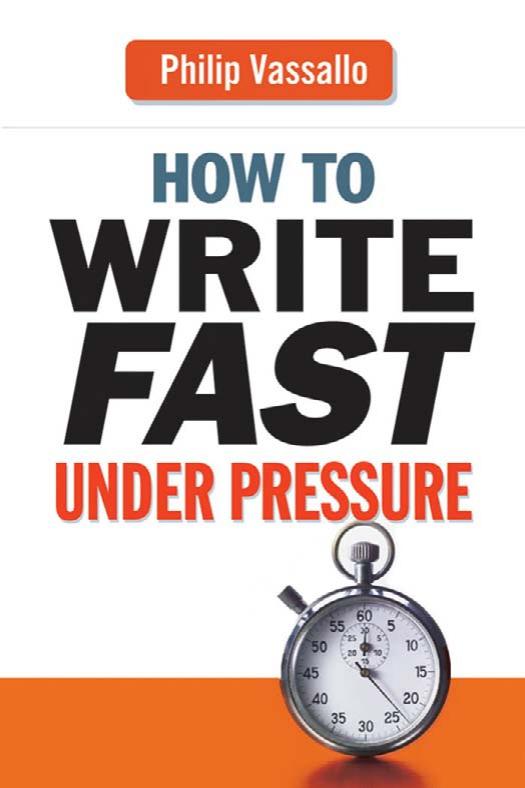How to Write Fast Under Pressure by Philip Vassallo

Author:Philip Vassallo
Language: eng
Format: epub, pdf
Publisher: AMACOM Books
Published: 2010-09-14T16:00:00+00:00
Mental Issues
Even the fastest writers among us can be slowed down when they’ve forgotten the meaning of a particular word they need to use or if they can’t find an appropriate synonym or antonym for a word. Depending on the nature of the document, there may be peculiar grammatical and stylistic rules that you may be unfamiliar with or can’t remember correctly. Following many of these tips should help quicken your pace when you’ve hit a tough patch.
Keep good reference books nearby. What books does Speedy Didi keep within an arm’s reach of her writing command-and-control center? The usual writer’s references like a dictionary, thesaurus, and grammar and style book, for sure. Each has its unique benefits: You can’t get definitions of words in a grammar and style book or thesaurus, synonyms in a dictionary or grammar and style book, or grammar tips in a dictionary or thesaurus. All three are necessary, as are their electronic counterparts. (More about online resources in a moment.) Those pocket-sized, abridged versions won’t do, either. Didi is a pro. She sees them as seriously limited and incapable of replacing the real thing, the way butchers wouldn’t trade in their heavy-duty knives for common kitchen varieties, and doctors would never replace their medical references with popular medical trade books.
Which ones would work best for you? Plenty are available from your favorite bookstore or shopping website. Should you get Houghton-Mifflin’s American Heritage Dictionary or the Oxford English Dictionary? Is Roget’s International Thesaurus any better than Webster’s New World Thesaurus, or would the Rodale Synonym Finder do? Which grammar and style book is best: Gregg Reference Manual, Harbrace College Handbook, Little, Brown Handbook, Random House Handbook, St. Martin’s Handbook, or any from the host of others that virtually every reputable publisher reprints every few years? That’s up to you—they’re all good. Just have these essential resources close by and make sure they don’t become dust collectors.
There are other must-have books for serious writers, as well. A book of quotations is indispensable when you’re called upon to deliver speeches or write articles or just looking for inspiration on a writing topic. Bartlett’s Familiar Quotations and The Viking Book of Aphorisms are just two of many excellent references that draw from literature, politics, and popular culture. The Forbes Book of Business Quotations is an excellent source not only from businesspeople but from entertainers, writers, philosophers, and creative minds from numerous disciplines, divided by topic and indexed by author of the quotation.
If presenting or publishing formal papers for work, professional development, or school is a priority, then you’ll need a citation stylebook like the MLA Handbook (Modern Language Association of America), Publication Manual of the American Psychological Association (APA Stylebook), Chicago Manual of Style, or its sister publication, A Manual for Writers of Research Papers, Theses, and Dissertations. Which one you choose depends on the reader’s requirements. For instance, my dissertation committee called for the Chicago Manual of Style, but I have published articles requiring MLA style and others requiring APA style.
Download
How to Write Fast Under Pressure by Philip Vassallo.pdf
This site does not store any files on its server. We only index and link to content provided by other sites. Please contact the content providers to delete copyright contents if any and email us, we'll remove relevant links or contents immediately.
Essentialism by Greg McKeown(1222)
Your Next Five Moves by Patrick Bet-David(1210)
Integrated Business Information Systems by Klaus-Dieter Gronwald(1099)
The Science of Rapid Skill Acquisition by Peter Hollins(912)
The Ten Equations That Rule the World by David Sumpter(727)
Improvise! by Max Dickins(696)
Speaking with Confidence by Nick Gold(677)
Idioms & Phrases by Informative Books(659)
How to Write Anything by Laura Brown(658)
The Ten Equations That Rule the World: And How You Can Use Them Too by David Sumpter(657)
Tableau For Dummies by Molly Monsey & Paul Sochan(641)
Voice-Overs for Podcasting by Elaine A. Clark(638)
The Social Skills Guidebook by Chris MacLeod(618)
How to Decide by Annie Duke(605)
Building a Career in Software by Daniel Heller(599)
Pomodoro Technique Illustrated: The Easy Way to Do More in Less Time (Pragmatic Life) by Staffan Noteberg(592)
How to Communicate Effectively With Anyone, Anywhere by Dan Bullock(576)
Perfecting Your Pitch by Ronald M. Shapiro(553)
The Book Every Leader Needs to Read by 48 Authors(550)
